 Petzlover
Petzlover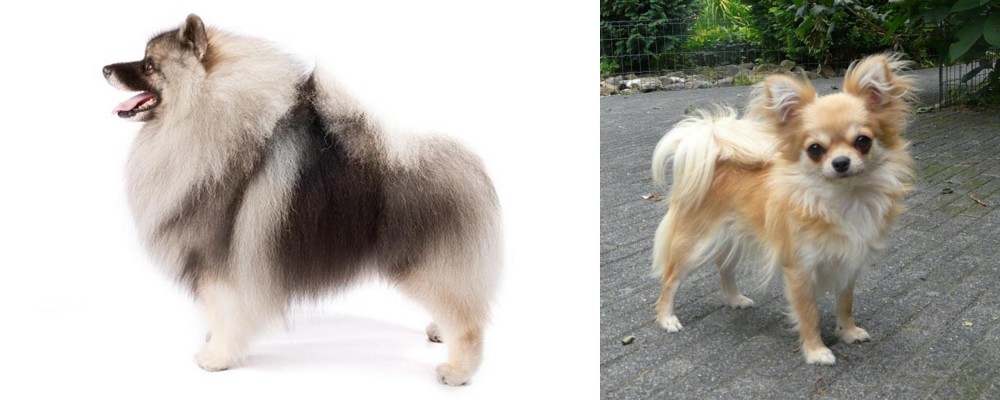 Keeshond is originated from Netherlands but Long Haired Chihuahua is originated from Mexico. Keeshond may grow 25 cm / 10 inches higher than Long Haired Chihuahua. Keeshond may weigh 15 kg / 34 pounds more than Long Haired Chihuahua. Keeshond may live 6 years less than Long Haired Chihuahua. Keeshond may have more litter size than Long Haired Chihuahua. Both Keeshond and Long Haired Chihuahua requires Moderate Maintenance.
Keeshond is originated from Netherlands but Long Haired Chihuahua is originated from Mexico. Keeshond may grow 25 cm / 10 inches higher than Long Haired Chihuahua. Keeshond may weigh 15 kg / 34 pounds more than Long Haired Chihuahua. Keeshond may live 6 years less than Long Haired Chihuahua. Keeshond may have more litter size than Long Haired Chihuahua. Both Keeshond and Long Haired Chihuahua requires Moderate Maintenance.
 Keeshond is the term used for German Spitzes and although many American references have it that the Keeshond originated in the Netherlands, some say the dog originated in Germany and is a member of the German Spitz family.
Keeshond is the term used for German Spitzes and although many American references have it that the Keeshond originated in the Netherlands, some say the dog originated in Germany and is a member of the German Spitz family.
The Club for German Spitzes was founded in 1899. The Nederlandse Keeshond Club was formed in 1924. The Keeshond is also referred to as ‘The Smiling Dutchman’.
It was in the 17th and 18th centuries that the Keeshond was used greatly as a watchdog, appearing in England in the late 1800s, but after the turn of the 20th century, Mrs. Wingfield Digby of Dorset, England and Mrs. Alice Gatacre, a Dutch breed authority, living in England, stirred interest in the breed with their kennels.
An English breed Club was formed in 1926, and the first Keeshond was registered with The American Kennel Club in 1930.
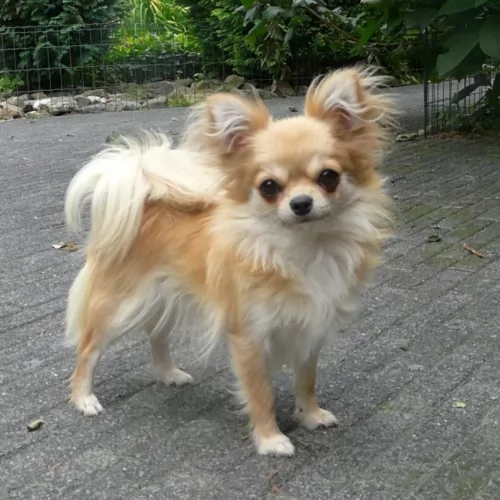 The short haired Chihuahua is such a recognizable dog breed, probably because of his tiny size, but did you know that you also get a long haired variety?
The short haired Chihuahua is such a recognizable dog breed, probably because of his tiny size, but did you know that you also get a long haired variety?
Looking quite a bit like a Pomeranian, the only difference between the two types of Chihuahua is the length of the coat.
This small dog dates back to Mayan times and while it may well have originated in Mexico, its popularity saw it becoming a sought after pet in other countries too.
To get the long haired Chihuahua, breeding programs were established and the short-haired variety was mated with other long haired toy sized dogs such as the Pomeranian and the Yorkshire Terrier.
 The Keeshond is a medium-sized dog and a member of the Spitz group of dogs. He stands at 43 – 48cm in height and weighs 14 – 18kg.
The Keeshond is a medium-sized dog and a member of the Spitz group of dogs. He stands at 43 – 48cm in height and weighs 14 – 18kg.
He has a 2-layered, dense coat which is fairly long, straight and coarse and colors are grey, silver, black and cream. His undercoat is a very light cream color. He has erect ears, a fairly shop muzzle and a feathery, plumed tail which curves over his back.
The hair on his legs is fairly short accompanied with some feathering. A typical marking-feature of the Keeshond is the dark line which runs from the outer corner of each eye to the lower corner of each ear. It's what gives the dog his well known keeshond expression. The eyes of the dog are dark brown.
The Keeshond, just like other Spitz dogs, are playful, affectionate, friendly and eager to please. He is intelligent too and will respond well to training and socialization.
He makes a wonderful family pet as he is friendly and playful with children, loving all their games. He gets on well with other pets too. He is a social dog, thriving on being with his human family, wanting to participate in all family activities.
They are sensitive, loving pets and become very attached to their owners. They have even been used as comfort dogs in rescue situations, as they bond so well with people.
He makes a good watchdog too with his loud bark which he uses to deter intruders. He may well be a good watch- and guard dog but he isn't an aggressive dog.
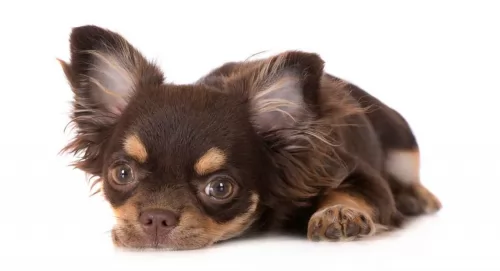 Your long haired Chihuahua will have a coat that is soft and slightly wavy. He weighs between 1 and 3kg and stands at about 15 – 23cm. He generally sheds throughout the year with a couple of heavier shedding periods during the year.
Your long haired Chihuahua will have a coat that is soft and slightly wavy. He weighs between 1 and 3kg and stands at about 15 – 23cm. He generally sheds throughout the year with a couple of heavier shedding periods during the year.
Don’t be fooled by the long, thick hair on the long haired Chihuahua as it doesn’t protect him from the cold – in fact he doesn’t tolerate the cold well at all, and is essentially an indoor dog. The ears are erect and feathery and the tail is full and plumed, lying over the back. He has a ruff on the neck, which is often described as a mane.
Chihuahuas are such bright-as-a-button little dogs and they’re intelligent too.
It’s difficult to say how a dog’s temperament will turn out, because breed, lifestyle and the type of owners can all make a dog a certain way.
Socialization and training can sometimes help with a dog that has bad genes. There are some people who say the Long haired Chihuahua is a nasty, aggressive little dog who’ll easily give you a nip but they’ve got a good reputation with many other dog lovers.
They love their own human family but may take quite a while to chill towards other people and other dogs too. They’re more ‘birds of a feather flock together’ type of dogs, preferring to get on with other Chihuahua dogs.
 The Keeshond, with his thick double coat, loves to be outdoors in cool weather. He won't be there too long however, because he will be missing his human family. He is such a social dog, craving human company and therefore isn't a dog to be put out in the backyard and left day after day.
The Keeshond, with his thick double coat, loves to be outdoors in cool weather. He won't be there too long however, because he will be missing his human family. He is such a social dog, craving human company and therefore isn't a dog to be put out in the backyard and left day after day.
He loves games and being totally involved with his human family. Look after your Keeshond well – he is a companion dog - and you will find him to be a most exceptional friend of yours.
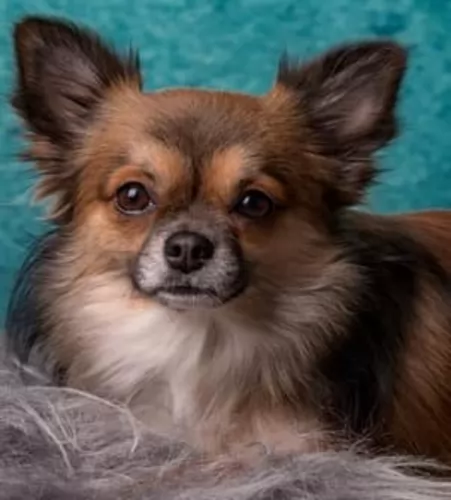 The Chihuahua is such a feisty, courageous, confident little dog who also believes that he is part- lion. He is loving, sweet and gentle and just loves being picked up and petted non-stop. He looks up at you, moving his front paws up and down to tell you that he wants to be picked up.
The Chihuahua is such a feisty, courageous, confident little dog who also believes that he is part- lion. He is loving, sweet and gentle and just loves being picked up and petted non-stop. He looks up at you, moving his front paws up and down to tell you that he wants to be picked up.
He is in 7th heaven when he can be cuddled up in your lap. You just have to teach your children to be very careful with him and not enter into games with him that are too rough and tumble. Tiny he may be but he makes a great watchdog too, barking and alerting you to strangers.
His small size makes him perfect for life in the city or in the countryside. Just be careful when in the countryside lest an Eagle or Owl scoop him up and carry him off to some faraway nest.
He doesn’t need a great deal of exercise either and you can actually keep him happily busy with some games indoors. He’ll always welcome walks with you though.
This small dog is full of life and confidence and he is ready to be your constant, loving companion.
 With good food, fresh water, exercise and lots of interaction with your Keeshond, he can reach 12 to 14 years of age.
With good food, fresh water, exercise and lots of interaction with your Keeshond, he can reach 12 to 14 years of age.
No matter how healthy your dog is, he can still get ill, but the chances are less likely when he is feed nutritionally. Nonetheless look out for hip dysplasia, bloat, ear infections, skin rashes and eye diseases.
This is a problem in the lens of the eye. Your dog has a cloudy look to the eye. A cataract can occur when the cells are damaged. A disease such as diabetes can also cause a cataract and high blood sugar levels can change the metabolism of the cells in the lens.
The lens should be crystal clear, but with a cataract, the vision of the dog is obscured. It can cause blindness. Thankfully, cataracts aren't painful and most times dogs with cataracts can still see. There is the option of surgery to remove them too.
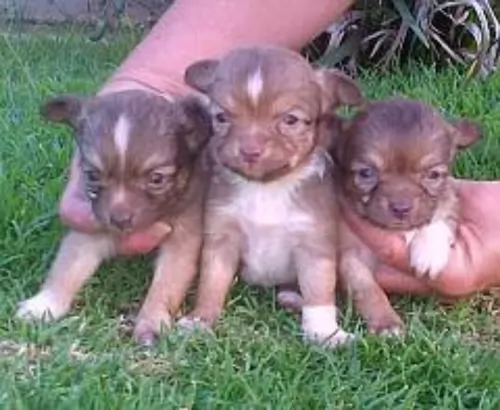 With good care, you’ll have your long haired Chihuahua with you for a long time – 15 years and longer.
With good care, you’ll have your long haired Chihuahua with you for a long time – 15 years and longer.
Make sure to de-worm your Chihuahua. Worms and other parasites can be deadly for your pet and the vet will do preventative deworming on a regular basis.
You Chihuahua will need to be vaccinated when he is a puppy and even when he is an adult, although less often. These vaccines will protect your Chihuahua from the likes of parvo, distemper and rabies. Have your chihuahua spayed or neutered.
There are so many puppies in the world who can’t find homes. Desexing your Chihuahua is a responsible way to ensure your pet doesn’t have puppies. Spaying and neutering can actually be beneficial for your dog’s health.
 With his double coat, your Keeshond will need regular brushing to get rid of all those loose hairs. He is a dog which doesn't have that typical dog odor about him so bathing him is discouraged. Too much bathing irritates a dog's skin and dries it out.
With his double coat, your Keeshond will need regular brushing to get rid of all those loose hairs. He is a dog which doesn't have that typical dog odor about him so bathing him is discouraged. Too much bathing irritates a dog's skin and dries it out.
Check the inside of his mouth and make sure that his teeth are in a healthy state. If you are unsure, speak to your vet about dental hygiene as bad teeth won't only cause pain and discomfort for your pet, the teeth can affect his immune system and other body parts.
Check his claws too and have them cut when they become too long. When they are long they can hook on things and injure the sensitive area of the paws.
The Keeshond is a sturdy dog, loving all the activities and games that his family are involved in. He will love to be your walking companion and looks forward to his walk every day.
He is such a playful, adventurous dog and is always willing to join you in new games. Never put him in your back garden and forget about him, as this will make him ill and depressed. He must be part of the family to be healthy and happy and relies on you to include him in all your activities. He can live in the city or the countryside but will require being exercised wherever he is.
Top quality dry kibble will work for your Keeshond. If you want to keep him bright eyed and bushy tailed, mix in some quality home-made food too such as cooked chicken, rice and vegetables. You can also try to sometimes include a little bit of raw meat as well.
He is an active dog and will need a diet high in protein. Also, his thick coat needs to be maintained, and apart from regular brushing, look for quality dog foods that have Omega-3 fatty acids in them so as to maintain the skin and coat of the dog. Make sure he always has access to fresh, cool water.
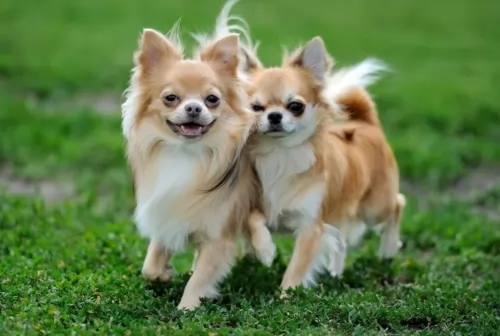 The pint-sized long-haired Chihuahua isn’t going to take up too much of your time in terms of grooming. Make sure you brush him at least twice a week to ensure his long hair doesn’t tangle. Small dogs are prone to dental problems, so try and brush his teeth at least 2 or 3 times a week with special doggy toothbrush- and toothpaste.
The pint-sized long-haired Chihuahua isn’t going to take up too much of your time in terms of grooming. Make sure you brush him at least twice a week to ensure his long hair doesn’t tangle. Small dogs are prone to dental problems, so try and brush his teeth at least 2 or 3 times a week with special doggy toothbrush- and toothpaste.
Take your puppy Chihuahua to the vet for his regular vaccinations to prevent him getting dangerous illnesses.
Feed him a high quality dog food. He is a high energy dog so buy high quality food that caters for small, lively dogs. Try and feed him such home made food from time to time. Remember that with small dogs, high-salt diets can contribute to kidney problems.
Never overfeed your Chihuahua as obesity opens up major health problems in Chihuahuas.